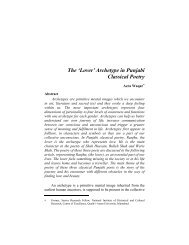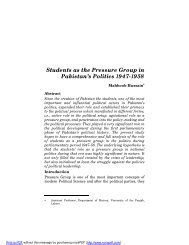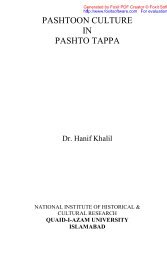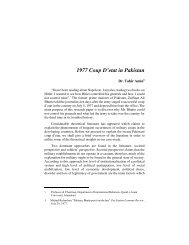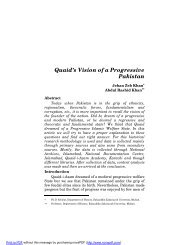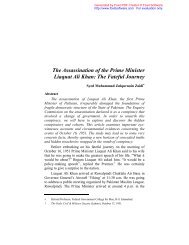The Baloch Resistance Literature Against the British Raj - Nihcr.edu.pk
The Baloch Resistance Literature Against the British Raj - Nihcr.edu.pk
The Baloch Resistance Literature Against the British Raj - Nihcr.edu.pk
You also want an ePaper? Increase the reach of your titles
YUMPU automatically turns print PDFs into web optimized ePapers that Google loves.
76 Pakistan Journal of History & Culture, Vol.XXVIII, No.1, 2007<br />
In one of his books, <strong>Baloch</strong>i Razmiyyah Sha‘iri, 2 he divides <strong>the</strong><br />
<strong>Baloch</strong>i resistance literature into four phases. In <strong>the</strong> first phase, he<br />
looks at <strong>the</strong> pioneers, beginning with Mir Chakar Rind and Mir<br />
Gawahram Lashari and ending with <strong>the</strong> writers in <strong>the</strong> middle of <strong>the</strong><br />
sixteenth century. This poetry is mostly in <strong>the</strong> shape of ballads and<br />
epics, dwelling on <strong>the</strong> achievements of great <strong>Baloch</strong> leaders. <strong>The</strong><br />
second phase covers <strong>the</strong> writings after <strong>the</strong> migration of Mir Chakar<br />
Rind and Mir Gowahram Lashari from <strong>Baloch</strong>istan covering <strong>the</strong><br />
period between <strong>the</strong> middle of <strong>the</strong> sixteenth century to <strong>the</strong> advent of<br />
<strong>the</strong> <strong>British</strong>. <strong>The</strong> third phase covers <strong>the</strong> <strong>British</strong> period up to 1930. <strong>The</strong><br />
last phase, according to Gul Khan Naseer, is <strong>the</strong> phase of “National”<br />
poetry.<br />
During 1930-47, <strong>the</strong> <strong>Baloch</strong> people used different methods and<br />
techniques to pursue <strong>the</strong>ir struggle for freedom from <strong>the</strong> <strong>British</strong>.<br />
<strong>The</strong>re were not many battles fought and not many physical<br />
confrontations. Ra<strong>the</strong>r, <strong>the</strong>y worked through constitutional and<br />
peaceful methods, principally through literature inspired by <strong>the</strong><br />
political struggle of <strong>the</strong> Muslims in o<strong>the</strong>r parts of India against <strong>the</strong><br />
colonial rule. Anjuman-i-Ittihad-i-Balūchān provided <strong>the</strong> platform<br />
and took <strong>the</strong> lead in disseminating diverse ideas, ranging from<br />
Communism to Khilafat movement and anti-<strong>British</strong> slogans borrowed<br />
from <strong>the</strong> Indian National Congress.<br />
Raham ‘Ali Marri (1876-1933) was one of <strong>the</strong> most prominent<br />
<strong>Baloch</strong> poets who not only composed poetry, but also actively<br />
participated in fights against <strong>the</strong> <strong>British</strong>. In one of his long epics, he<br />
addresses <strong>the</strong> “traitors” who sided with <strong>the</strong> <strong>British</strong> and says, “like a<br />
cattle herd, <strong>the</strong>y followed <strong>the</strong> pagans and lost <strong>the</strong>ir faith both in <strong>the</strong>ir<br />
history and religion.” 3 In fact, <strong>the</strong>re are numerous references to early<br />
Islamic heroes in Raham ‘Ali’s poetry to show that <strong>the</strong> <strong>British</strong><br />
aggression in <strong>Baloch</strong>istan and <strong>the</strong> <strong>Baloch</strong> resistance were like a war<br />
between truth and falsehood: “With <strong>the</strong> blessing of God and for <strong>the</strong><br />
honour of Ali’s 4 horse, we will kill this serpent (<strong>the</strong> <strong>British</strong>) which<br />
has sneaked into our homes.” 5 Raham ‘Ali was particularly critical of<br />
<strong>the</strong> collaborators of <strong>the</strong> <strong>British</strong> without whose help <strong>the</strong> latter would<br />
2. Mir Gul Khan Naseer, <strong>Baloch</strong>i Razmiyyah Shā‘iri (Quetta: 1979), p.32.<br />
3. Ibid., p.194.<br />
4. Cousin and son-in-law of <strong>the</strong> Prophet Muhammad (PBUH) who was known for his<br />
bravery and nobility both in war and peace.<br />
5. Kāmil al-Qadiri, <strong>Baloch</strong>i Adab Ka Mutāli‘ah, (Quetta: 1976), pp.148-52.



